Queen Cheorin (Mr. Queen), gendered representations of power, and historical inevitability
#11 of 2K21
Where does dynastic rot begin?
In some historical circles, it’s argued that the beginning of Joseon’s downfall lies not with Gojong (the last king of Joseon) and his weakened imperial power after the betrayal of a select group of aristocrats colluding with the Japanese empire, nor even the end of Sino-Korean relations following the cessation of China’s tributary system after their loss in the first Sino-Japanese war. The argument is that the small country of Joseon was destined to eat itself alive on the premise of its own internal corruption, and external forces only hastened what was already coming.
Every time I watch a new sageuk, it feels like an exercise on finding a possible turning point. We practice revisionist history to understand not only where things went wrong, but where a potential solution was cut short. For me personally, the catharsis of watching some sageuks is not to see historical accuracy but to see the full potential of that solution play out and answer, ultimately, whether Joseon could have been saved.
(Of course, the question of whether Joseon should have been saved is one for a later time.)
In Korean history, there are two instances that stand out as possible turning points. The first is the reign of Jeongjo, the 22nd king of Joseon (currently played by Junho in The Red Sleeve). After inheriting the unstable legacy of his grandfather’s marred reign, Jeongjo revolutionized certain practices in the strictly caste-based hierarchy of Korea, including opening government positions beyond the upper yangban class and creating a royal library to recruit talented public servants for his administration. Jeongjo’s reign is commonly regarded as the renaissance of Joseon, yet he did not live to see much of the results of his policies. Jeongjo died under suspicious circumstances at the age of 47, in the midst of political in-fighting with his step-grandmother, Queen Dowager Jeongsun, who had married his 66-year old grandfather at just 15 years old.
His son Sunjo, despite attempts to uphold his father’s legacy, reigned partly under Queen Dowager Jeongsun’s regency, which led to the deterioration of the ruling principles that Jeongjo had tried so hard to establish. Nepotism reigned in favor of the Andong Kim clan, rendering the court ineffective and prone to corruption. It was during Sunjo’s reign that the Donghak Peasant Revolution (the historical premise of the drama Nokdu Flower) broke out, leaving the aristocracy in constant fear of progressivism that could break the social stratification of the caste system.
The second turning point is the tragic early death of Crown Prince Hyomyeong (played by Park Bogum in Love in the Moonlight), the son of Sunjo and the grandson of Jeongjo, which is really where our connection to Queen Cheorin begins. Hyomyeong is regarded as an artistic genius whose control of the court was rooted in his use of literature and court rituals. Some scholars even contend that he could have been a successor to King Sejong’s legacy, had he not died at the age of 21 from unknown causes. His early death all but ensured a repetition of his father’s reign, where his son Heungjo would become a puppet to his regent grandmother, Queen Sunwon (the main antagonist of Mr. Queen). Heungjo also died early at 21, leaving behind no heirs and a queen regent who refused to let go of her grasp on the throne.
[Are you confused? Understandable! To recap: Jeongjo (22) → Sunjo (23) → Crown Prince Hyomyeong → Heungjo (24) → Cheoljong (25)]
As depicted in the drama, Cheoljong was a distant relative who grew up on Ganghwa Island as an exiled royal. He was illiterate and uneducated, unaware of court customs or even a basic level of etiquette. Queen Sunwon encouraged this behavior for the rest of his reign, preferring to keep him ignorant and pliable for control. Nowhere in the Annals of Joseon is Cheoljong even remotely close to the character played by Kim Jung-hyun, but Mr. Queen asks an intriguing revisionist question through his character, stemming from the fact that he is arguably the closest we’ve ever gotten to a commoner for a king. If he had wanted, could he have changed anything?
The drama answers this question for us — no, he probably couldn’t. Not unless his queen was a different person entirely.
As an adaptation of the Chinese drama Go Princess Go, Mr. Queen is very much a case of history following premise, in that the writer already had the framework of the plot before the actual historical setting. However, what’s interesting is that the writer decided to situate the story in the court of a real king, rather than creating a fictional court which would have arguably provided more narrative freedom, especially considering the ridiculous premise.
As the second to last king of Joseon notably reviled for his uncouth mannerisms and ignorance, Cheoljong has never really been a popular figure for fictionalization. Yet it makes sense why he was chosen out of any other king, even a fictional one. All Joseon kings are insecure in their power, but Cheoljong was one of the first cases of an outsider king, someone who had no choice but to be a puppet because the alternative was life in the gutter or death. Besides this point of relatability, Cheoljong was also a king who operated in an utterly powerless capacity due to his background and illiteracy. In short, while there had been numerous instances of dowager queens operating as regents and taking power in court, Cheoljong’s reign was defined less by the man himself and more by the woman (and her clan) who had put him there.
Cheoljong’s story is thus a story of gender as much as it is about power, and So-yong as a character is a perfect vessel to think about the gender dynamics of the Joseon court. As a character, So-yong is made sympathetic to the viewer by convincing us of the reality of her emotions and her integrity, and showing us how she was a victim to circumstance. Despite her position, she had hardly any power except for what she could derive from her family.
While we have no idea of the internal life of a woman who left behind no personal records, what we do know of the real Queen Cheorin is that she was very much a stooge of the Andong Kim clan, perfectly placed to maintain an iron grip on the court. She was a successor to a lineage of women whose regencies and subsequent nepotism and corruption led to a degradation of the Joseon court, making the entire country vulnerable to both domestic and foreign conflict and ultimately leading to the end of a dynasty. That is the position that So-yong is essentially being groomed to fill; it’s the only way for the Andong Kim clan to maintain control of the throne, by maintaining their control over her.
Again, there’s no way to know if Queen Cheorin willingly or unwillingly complied with this position. Mr. Queen chooses to believe in the latter. And by making a character such as So-yong sympathetic from the start, the drama has the opportunity to ask certain questions about complicity and accountability. What does it mean for women to be given even the illusion of power in a rigidly patriarchal court and country? What would they do to maintain their control? Are they really in control? Who can really be held responsible?
Into this mix, Mr. Queen inserts Bong-hwan, a 21st century man engaged in a traditionally feminine occupation and yet who also maintains a very traditionally masculine attitude. Of course, the drama’s first and foremost concern is to take its crazy premise and derive entertainment as a comedy with a fairly broad streak of humor; I doubt the writer pursued the work with the intention of providing a nuanced critique of gender in 19th century Joseon. But Bong-hwan’s presence, especially in the first act of the story, provides an extremely useful external view that points out the irregularities of the Joseon court and its gender dynamics, and also provides the momentum to make the story’s revisionist history possible.
As a character completely new to the world he is now forced to occupy, Bong-hwan begins in a neutral position with the sole goal of going safely back home. He’s thus quick to discern the power structure of the court (Dowager Queen > King) and his own position in it, making him unusually keen to the limitations of his role as a queen. Whereas at any other point in history, Bong-hwan could have relied on the protection of the king, he instead pinpoints the Dowager Queen as his path to safety. Yet what’s interesting here is that Bong-hwan’s gendered behavior flips between his interactions with the king and the Dowager Queen. As the king’s wife, he might have ensured his protection by performing traditionally feminine roles, but he instead impresses the king by performing with a kind of audacity and brashness that culminates in him saving Jo Hwa-jin out of pure ego and spite.
In contrast, Bong-hwan maintains his relationship with the Dowager Queen by cooking for her, even as she gradually loses patience with him. Of course, it’s the quality of his dishes that keep him in her favor, but Bong-hwan never fully breaks the code of feminine subservience, even going so far as to provide modern Korean beauty tips to flatter her vanity.
What does this tell us? To some aspect, it shows the fragility of gender and gendered behavior, and how it sometimes becomes a performance that’s only secondary to an understanding of one’s position of power. Despite arguably being the most powerful person in court, the Dowager Queen does not do away with gendered performances; instead, she enforces them even more strongly because it is where her power comes from. On the other hand, Bong-hwan’s masculinity becomes appealing and even empowering to Cheoljong, who operates in an almost emasculated position in court due to his inherent lack of power. That’s the same Cheoljong of history, the one who was revised for this drama to restore to a more masculine status.
Does this mean that masculinity is inherently good and that it’s femininity that caused corruption and decay in Joseon? Absolutely not. What I mean is that Bong-hwan/So-bong’s character and their gender fluidity shows us how gender itself has nothing to do with morality or judgement, and that it is often an exhibition of power. Bong-hwan provides a useful lens through which to disassociate gender from power, to show us, once again, how much of it is a performance.
In essence, the responsibility of the corruption of the Joseon court cannot be isolated to the women who occupied the position of Dowager Queen and strengthened their clans. The Dowager Queen is absolutely complicit, but her brother is a representation of the men in her clan who puppeteered their control over the country and who have engineered the decay of the moral standing of the court; on a larger scale, her brother and all of the scheming politicians represent the paranoia and greed of the larger aristocracy. The destructiveness of this power is shown to affect not only those outside of the clan but its internal members as well; Byeong-in basically destroys himself in his divided loyalties. Similarly, So-yong is placed in the same position, and she is made sympathetic because of her visible divided loyalties. We also don’t know if So-yong, in her bitterness and hopelessness, would have eventually ended up like the Dowager Queen, especially if Cheoljong had seen her operate as expected within the realms of subservient femininity and never given her a chance. (Or he might have just killed her, as originally planned.)
A slight tangent about the body-swap problem and the show’s problematic ending: what Mr. Queen has is a classic Korean drama situation, where one body-swap character’s growth and development (usually the owner of the body) is essentially sacrificed for another’s. This problem becomes most critical in romance dramas, since it then becomes difficult to discern exactly who the love interest is in love with and also brings a whole lot of icky questions of consent regarding the body, etc.
A good case study is the 2015 drama Oh My Ghostess, starring Park Bo-young and Jo Jung-seok, where Park Bo-young’s character Bong-sun becomes possessed by Soon-ae, a ghost (played by Kim Seul-gi). In this drama, the division of identity is clear and Na Bong-sun is a defined character in her own right. The drama also attempted to address the issue of “who’s in love with who” head on, by giving Bong-sun the ability to consent to the occupation of her body and to also be present during key pivotal romantic moments. But let’s be real — Jo Jung-seok’s character only really begins to fall in love with Bong-sun when she is possessed by Soon-ae, and the majority of their relationship development happens while Soon-ae is in control. The ending of the drama thus ultimately falls flat, since it is unable to resolve this key conflict.
Mr. Queen should have had foresight of this problem, considering its predecessors, and I do think it attempted to address the issue by creating this “combination” moment between So-yong and Bong-hwan (and also giving narration control over to Shin Hye-sun, rather than Choi Jin-hyuk). But again, this falls flat on its face without properly fleshing out So-yong’s character and internal voice, and it also doesn’t address Bong-hwan’s identity crisis and the idea that he has essentially lost a part of himself. And of course, not only does Cheoljong remain ignorant of the situation even at the end of the drama, he is essentially left to live his life with So-yong despite having fallen in love with Bong-hwan. As many other viewers have mentioned, it’s an inauthentic and unsatisfactory ending that the writer could have resolved by introducing So-yong earlier on in the story and giving her character as much narrative weight as Bong-hwan.
In any case, the ending of the drama also rings false because of how it concludes the political conflict with a deus ex machina and basically unravels the credibility of the revisionist history that had been set up beforehand. In fact, unlike how the happy ending reclaims power for Cheoljong, the character of Bong-hwan and his initial neutrality shows us how powerless all of the characters are, regardless of protagonist or antagonist, because of their entrapment in the power dynamics at the court. Without a resolution of those dynamics, there can be no happy ending.
What this shows us, then, is a sense of inevitability to the history of Joseon, one that could not even be repaired with as much revision and fantasy that this drama provided. It doesn’t matter if Cheoljong is actually an intelligent principled man or if So-yong was actually sympathetic to his cause; it doesn’t matter if the Andong Kim clan falls. I especially understand the poetic drama of Cheoljong, a virtual peasant-made-king, leading a peasant rebellion in an echo of the Donghak Peasant Revolution, and the hope that this would be enough to eradicate the poison of the aristocracy.
But the presence of the Pungyang Jo clan as an alternative shows us that the Joseon court is a hydra; a new head will always grow. And indeed, after Cheoljong died in 1864 without any heirs, the Pungyang Jo clan actually stole the royal seal and installed Gojong, another royal relative, as Cheoljong’s successor. The Andong Kim clan was subsequently pushed out of their dominant position, but the aristocracy remained — the same aristocracy that had undermined its own royal family for a century in the name of their greed and hunger for power; the same aristocracy that would sell its own country and countrymen to maintain their wealth and status. Gojong would be the last king of Joseon, and Korea would become a part of the Japanese empire by 1910.
I don’t know if the same happens in the world of Mr. Queen; the ending is rushed and far too ambiguous to understand the full implications of its revisionist history. Indeed, like other sageuks that pursue a virtual rewrite of historical fact (see: Love in the Moonlight), the ending’s ambiguity is necessary for the viewers to imagine that better world, better version of Korea for themselves. Historical inevitability is perhaps unbearably depressing.
But there’s a reason why Koreans are known for their fatalism, why everything hinges on destiny and what is meant to be. It’s because there is power in the decision to fight on, to not give up, even when one knows what’s coming. I’d like to think that Mr. Queen’s version of Cheoljong and So-bong recognized the same power, and that is the legacy they left behind for this alternative version of Korea.
—
Questions? Comments? Feel free to DM me on Twitter.



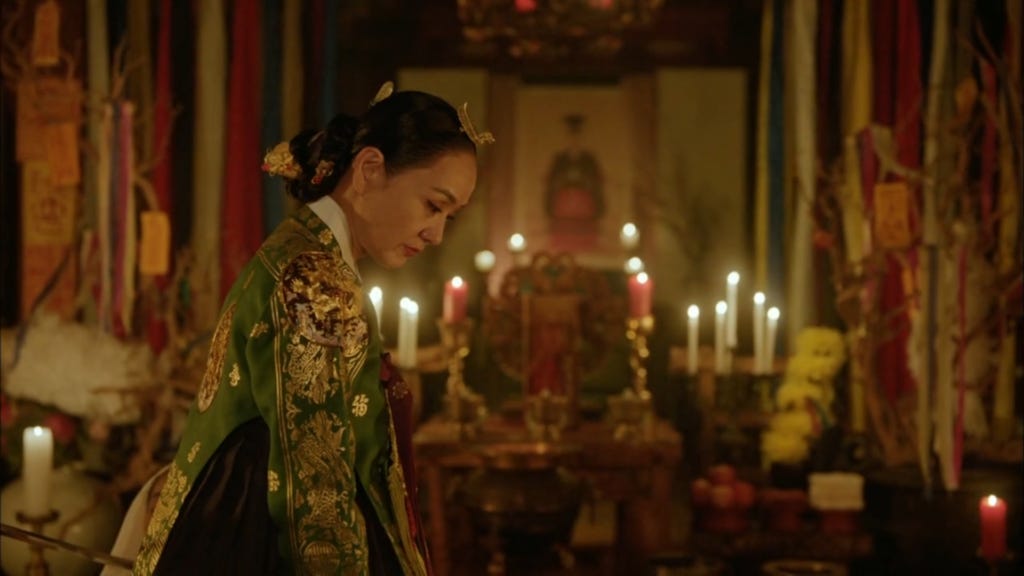
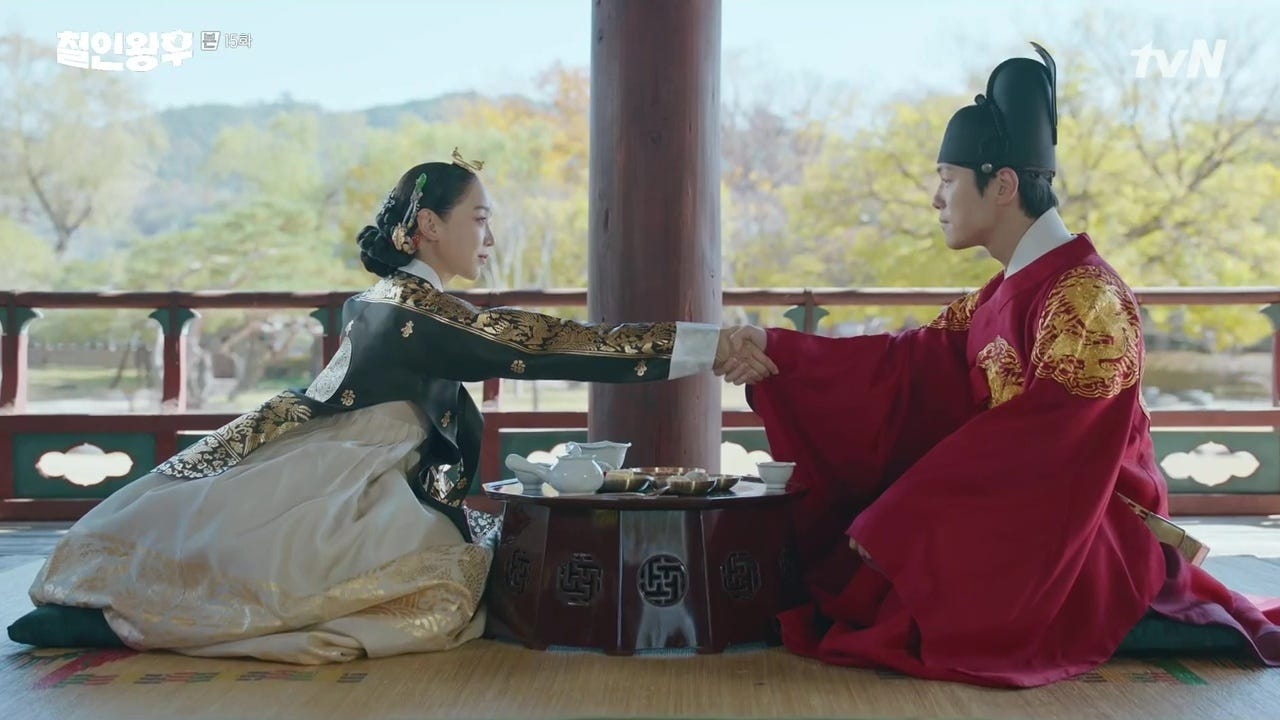
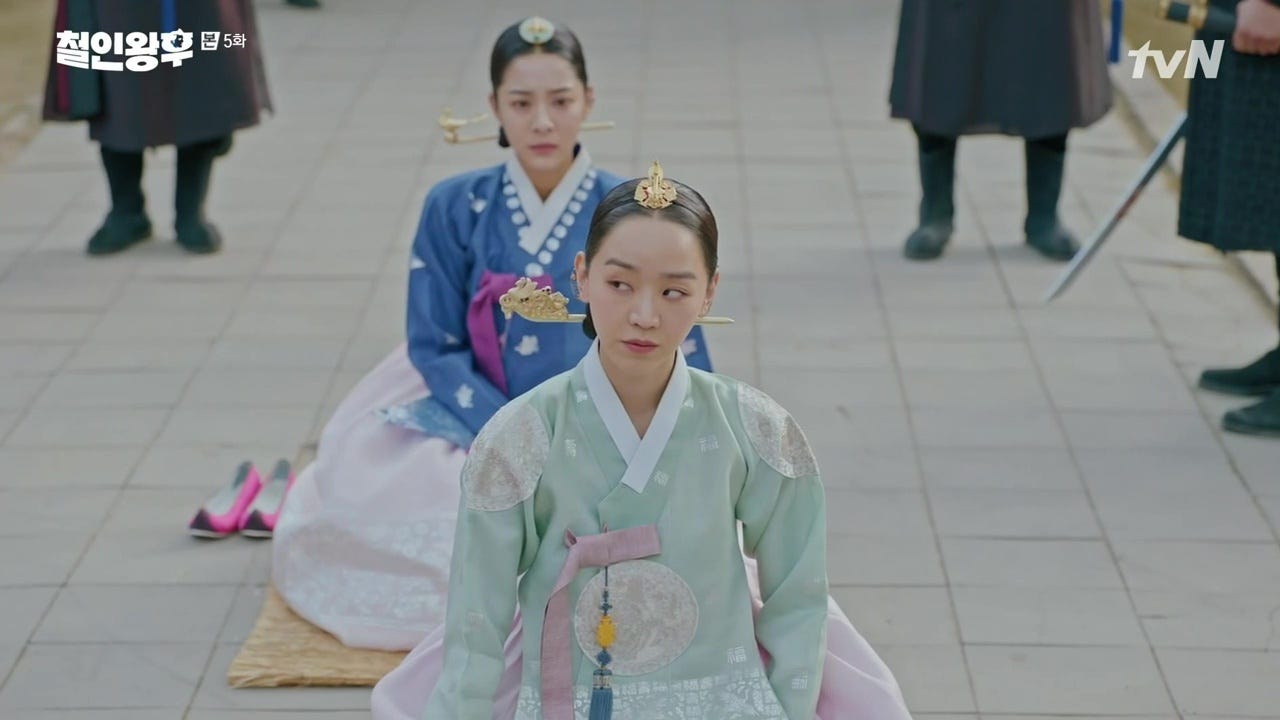
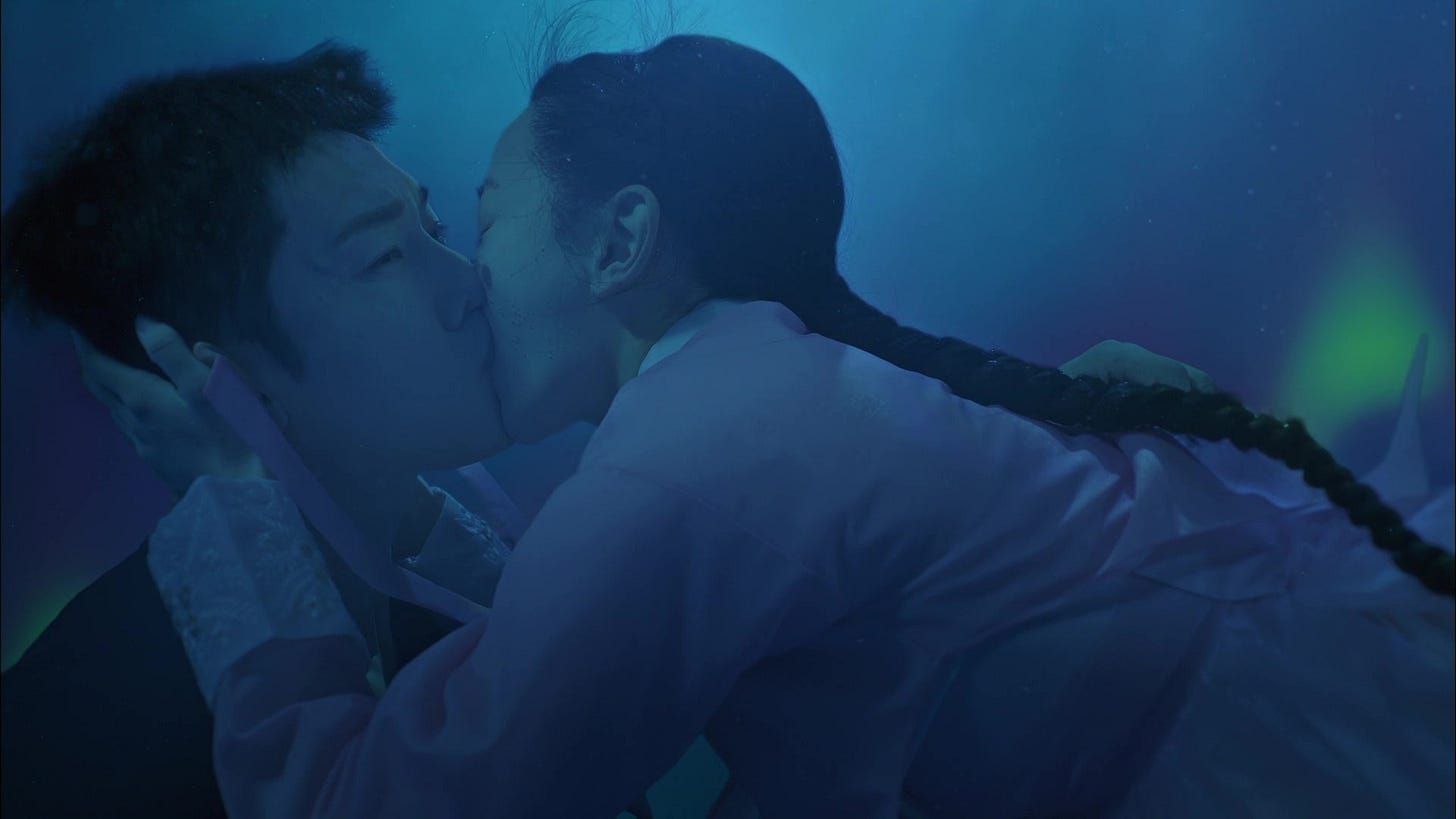
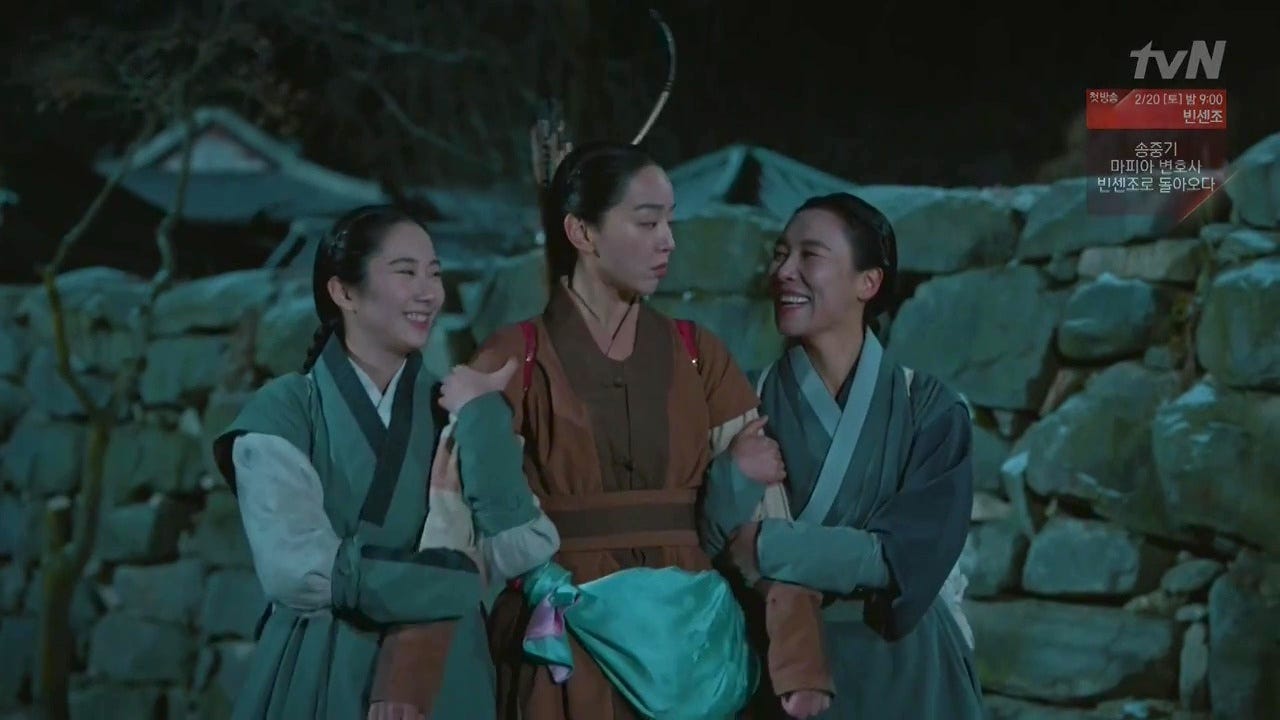
A great report. I'm glad someone else saw what I saw.